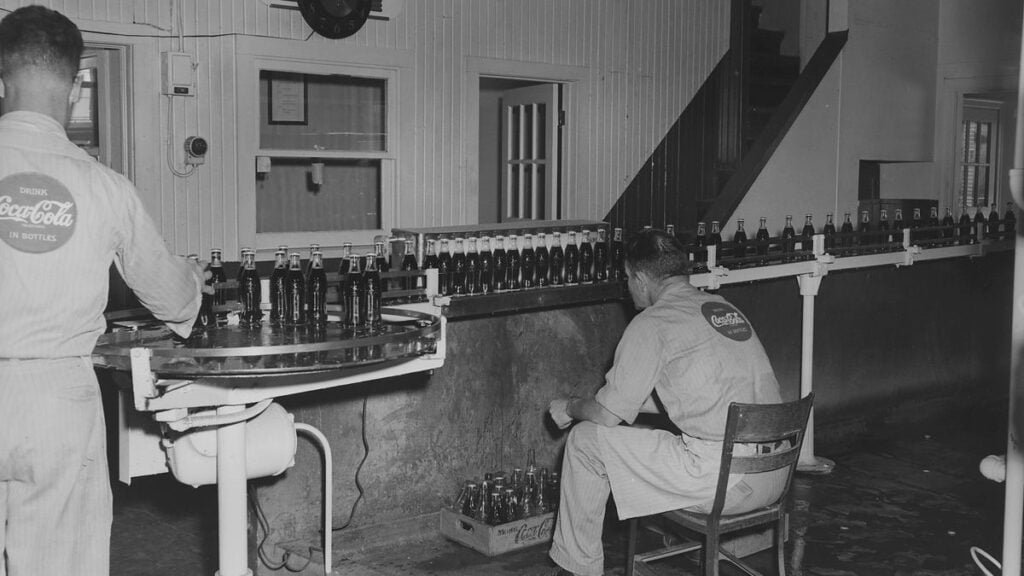Coca-Cola was founded in 1886 by Dr. John Stith Pemberton in Atlanta, Georgia. Since then, it has become an essential part of the state’s identity and economy. The Coca-Cola Company has a significant presence in Georgia, employing over 9,400 people at more than 30 facilities. This large workforce not only benefits local economies but also supports various industries through Coca-Cola’s extensive supply chain.
The economic impact of Coca-Cola in Georgia is substantial. The company invests heavily in community programs, creating job opportunities and promoting small business growth by selling bottling rights to local companies. These initiatives strengthen Coca-Cola’s position as a major player in both the state’s economy and cultural landscape.
This article explores five key insights about Coca-Cola’s contributions to Georgia:
- Job Creation and Workforce Development Initiatives
- Local Investments and Community Development Initiatives
- Cultural Significance and Brand Loyalty Strategies
- Resilience During Crises: COVID-19 Impact and Recovery Strategies
Understanding these aspects reveals how deeply intertwined Coca-Cola is with Georgia’s economic fabric.
1. Job Creation and Workforce Development Initiatives

Coca-Cola plays a vital role in job creation within Georgia. The company employs over 9,400 individuals across more than 30 facilities statewide. This significant employment number highlights Coca-Cola’s commitment to the local economy.
Importance of Employment
Employment serves as a cornerstone for local economies, providing stability and income for families. Coca-Cola’s presence in Georgia contributes to reducing unemployment rates and enhancing the standard of living for many residents. When people are employed, they spend money on goods and services, further stimulating economic growth within their communities.
Workforce Development Programs
Recognizing the necessity of investing in its workforce through various development initiatives, Coca-Cola has rolled out several notable programs. One such example is the company’s training and education programs for truck drivers. These programs aim to address the pressing shortage of qualified drivers in the industry, which is crucial given that Georgia moves over 435 million tons of goods annually.
Key aspects of Coca-Cola’s workforce development efforts include:
- Financial Support: Recently, Coca-Cola pledged $1 million to support the Technical College System of Georgia’s Commercial Truck Driving Program. This investment aims to create job opportunities while enhancing skills in a vital sector.
- Partnerships with Educational Institutions: Collaborations with technical colleges ensure that training aligns with industry needs, enabling graduates to secure employment effectively. This approach mirrors the broader American Rescue Plan investments aimed at workforce development, which includes funding for logistics education programs as highlighted in a recent report by Georgia.org.
- Career Progression Opportunities: Employees at Coca-Cola have access to continuous education and career advancement pathways, empowering them to grow within the organization.
Coca-Cola’s focus on job creation and workforce development not only strengthens its operational capabilities but also enriches the communities it serves. This commitment fosters a skilled labor force ready to meet future challenges in an evolving market landscape.
2. Local Investments and Community Development Initiatives
Coca-Cola’s commitment to local investment projects in Georgia plays a significant role in community development. The company’s efforts not only drive economic growth but also foster a sense of belonging and engagement among residents.
Key Investments
- Community Projects: Coca-Cola has invested in various community initiatives across the state. These projects range from educational programs to environmental sustainability efforts, all aimed at enhancing the quality of life for Georgians.
- Support for Small Businesses: By selling bottling rights to local entrepreneurs rather than establishing large-scale plants, Coca-Cola strengthens local economies. This strategy has empowered small businesses in cities such as Atlanta, Athens, Rome, and Savannah, creating jobs and boosting local commerce. Such support aligns with broader funding opportunities for small businesses that are essential for economic resilience.
Successful Initiatives
- Bottling Rights Empowerment: Coca-Cola’s approach allows local bottlers to operate independently while still being part of a global brand. This model not only creates employment opportunities but also encourages innovation and competition among local businesses.
- Investment in Education: A notable initiative includes Coca-Cola’s recent pledge of $1 million to support the Technical College System of Georgia’s Commercial Truck Driving Program. This investment addresses critical driver shortages within the trucking industry, vital for Georgia’s economy. Such investments in education are crucial components of any comprehensive American Jobs Plan aimed at bolstering workforce development.
- Environmental Programs: Coca-Cola engages in sustainability efforts that benefit both the environment and local communities. Initiatives include water conservation projects and recycling programs, which enhance community well-being while promoting responsible resource usage.
The impact of these investments is profound, highlighting Coca-Cola’s role as a catalyst for economic development and community enhancement throughout Georgia. The company’s dedication to fostering small business growth ensures that it remains deeply embedded in the cultural and economic fabric of the state. This mirrors the kind of community-focused initiatives that other corporations are also adopting to advance opportunity, equity, and inclusion within the communities they serve.
3. Cultural Significance and Brand Loyalty Strategies

Coca-Cola’s cultural significance in Georgia is profound, rooted deeply in its history since its inception in Atlanta in 1886. Dr. John Stith Pemberton’s creation of the beverage quickly transformed from a local tonic to a global icon, largely thanks to innovative strategies implemented by Asa Candler.
Historical Significance
Local Origins
Coca-Cola began as a small pharmacy product, capturing the hearts of Atlantans with its unique flavor.
Community Engagement
The company’s local presence fostered a sense of pride among Georgians, who saw it not just as a beverage but as part of their identity.
Brand Loyalty Strategies
Asa Candler played a pivotal role in establishing brand loyalty through several innovative marketing techniques:
- Aggressive Advertising: Candler utilized slogans and catchy phrases that resonated with consumers. His marketing campaigns were groundbreaking at the time, elevating Coca-Cola to household status.
- Community Events: Sponsoring local events and festivals helped embed Coca-Cola into community traditions, reinforcing its image as an integral part of Georgia’s cultural landscape.
- Merchandising Ventures: The introduction of promotional items such as branded glassware and clothing created tangible connections between consumers and the brand.
Coca-Cola’s impact extends beyond just being a beverage. Its marketing efforts have successfully created an emotional bond with consumers, turning them into loyal advocates. This loyalty fuels not only sales but also supports local economies through various community-driven initiatives.
In essence, Coca-Cola is more than a drink; it is woven into the fabric of Georgia’s culture, embodying both tradition and innovation through effective brand loyalty strategies.
4. Resilience During Crises: COVID-19 Impact and Recovery Strategies
The COVID-19 pandemic had a significant impact on Coca-Cola’s operations in Georgia, reflecting the broader economic challenges faced throughout the state. Here are some key effects:
1. Disruption of Supply Chains
Restrictions and lockdowns led to interruptions in production and distribution channels.
2. Decline in Demand
With restaurants and entertainment venues closed, Coca-Cola experienced significant drops in sales, particularly in its fountain drink segment.
In response to these challenges, Coca-Cola implemented several recovery strategies aimed at adapting to the new normal while supporting local communities:
1. Health and Safety Measures
The company prioritized the health of its employees by adopting rigorous safety protocols in manufacturing facilities. This included:
- Regular health screenings
- Enhanced sanitation practices
- Social distancing guidelines within workplaces
2. Community Support Initiatives
Recognizing the hardships faced by local businesses and communities, Coca-Cola took proactive steps to lend support:
- Pledged financial contributions to local organizations aiding pandemic relief efforts
- Provided essential products such as beverages for frontline workers and hospitals
3. Innovative Product Offerings
To address changing consumer behaviors, Coca-Cola diversified its product lines, introducing smaller packaging options for at-home consumption and enhancing online delivery services.
4. Focus on Sustainability
The pandemic prompted Coca-Cola to reinforce its commitment to sustainability by investing in environmentally friendly practices even during economic uncertainty. Efforts included:
- Supporting recycling programs
- Promoting initiatives aimed at reducing plastic waste
Coca-Cola’s ability to pivot during the pandemic demonstrated resilience not only in maintaining operations but also in reinforcing its connection with Georgia communities. As a cornerstone of the state’s economy, the company’s actions during this crisis highlighted both its adaptability and commitment to supporting local stakeholders amidst adversity.
This adaptability is not just a business strategy but also a reflection of broader societal trends towards resilience, as discussed in various studies on resilience during crises and the impact of such crises on different sectors.
Conclusion
Coca-Cola’s influence on Georgia’s economy remains profound. Key contributions include:
- Job Creation: Employing over 9,400 people across the state.
- Community Investment: Supporting local initiatives that boost economic development.
- Cultural Legacy: Deeply rooted in Georgia’s identity since 1886.
The future implications for Georgia’s economy hinge on sustained support for companies like Coca-Cola. Engaging with local businesses fosters economic resilience and growth.
Consider investing your time and resources into these entities to bolster community strength and ensure a vibrant economic landscape in Georgia.









Discussion about this post